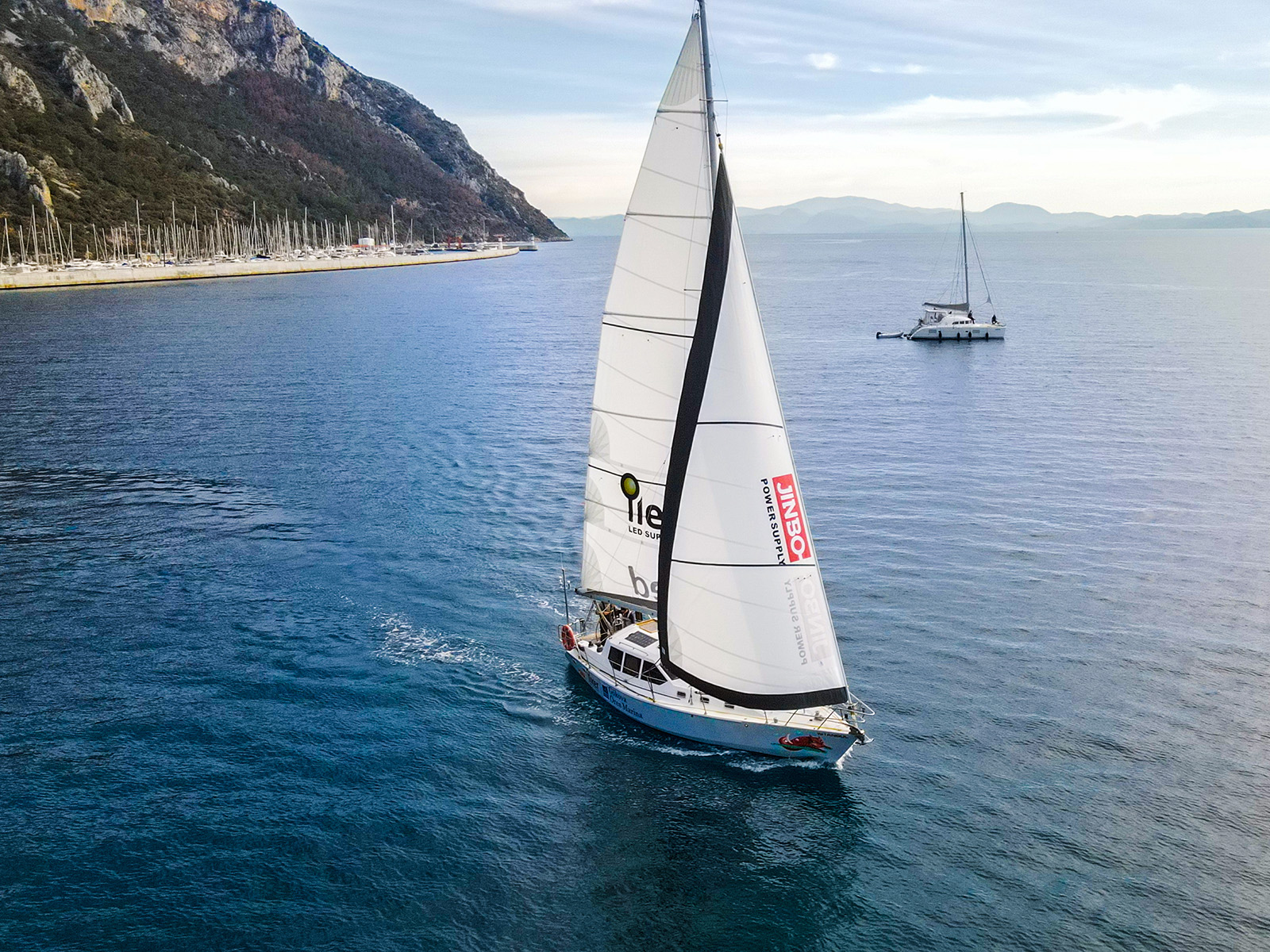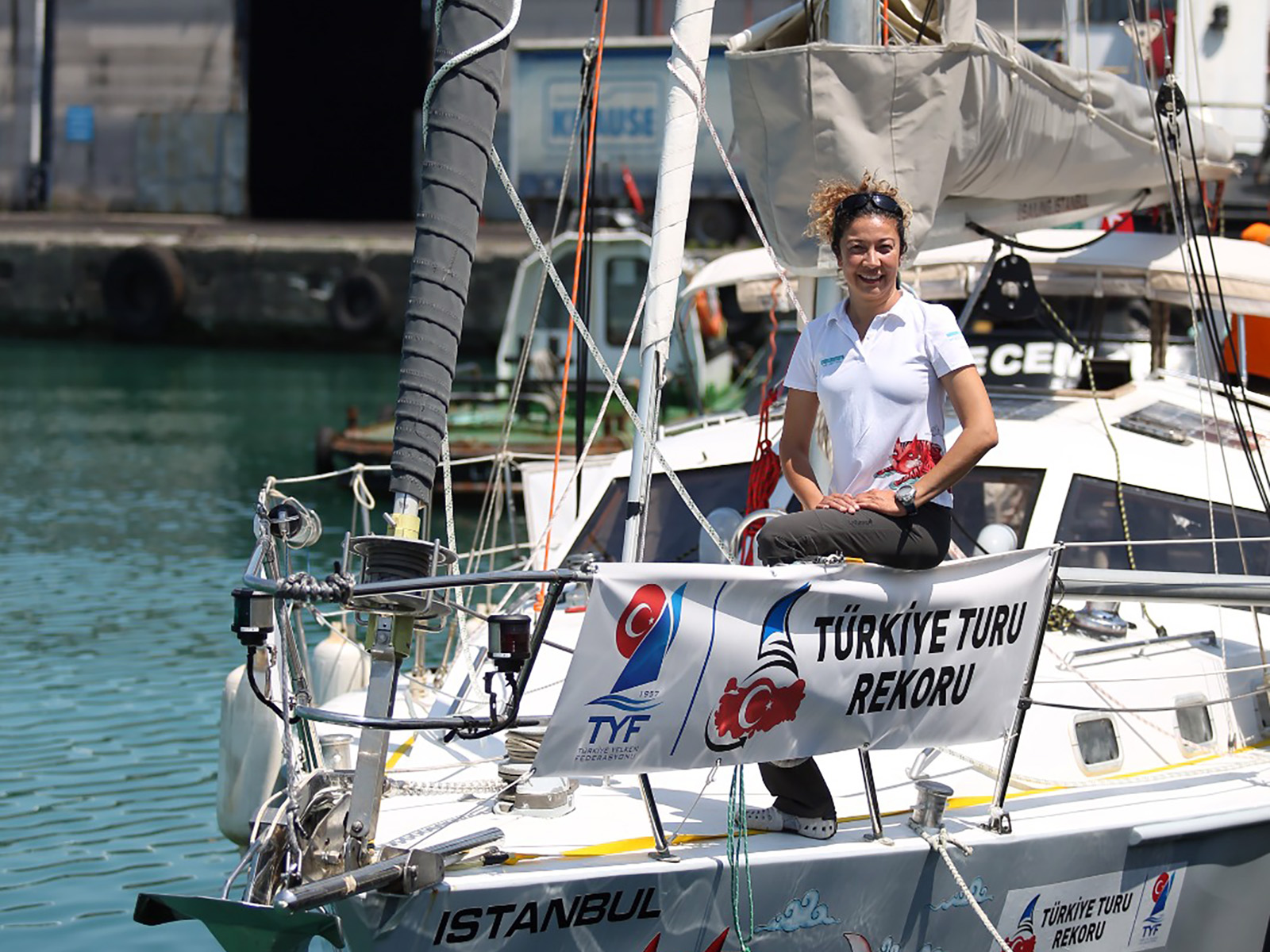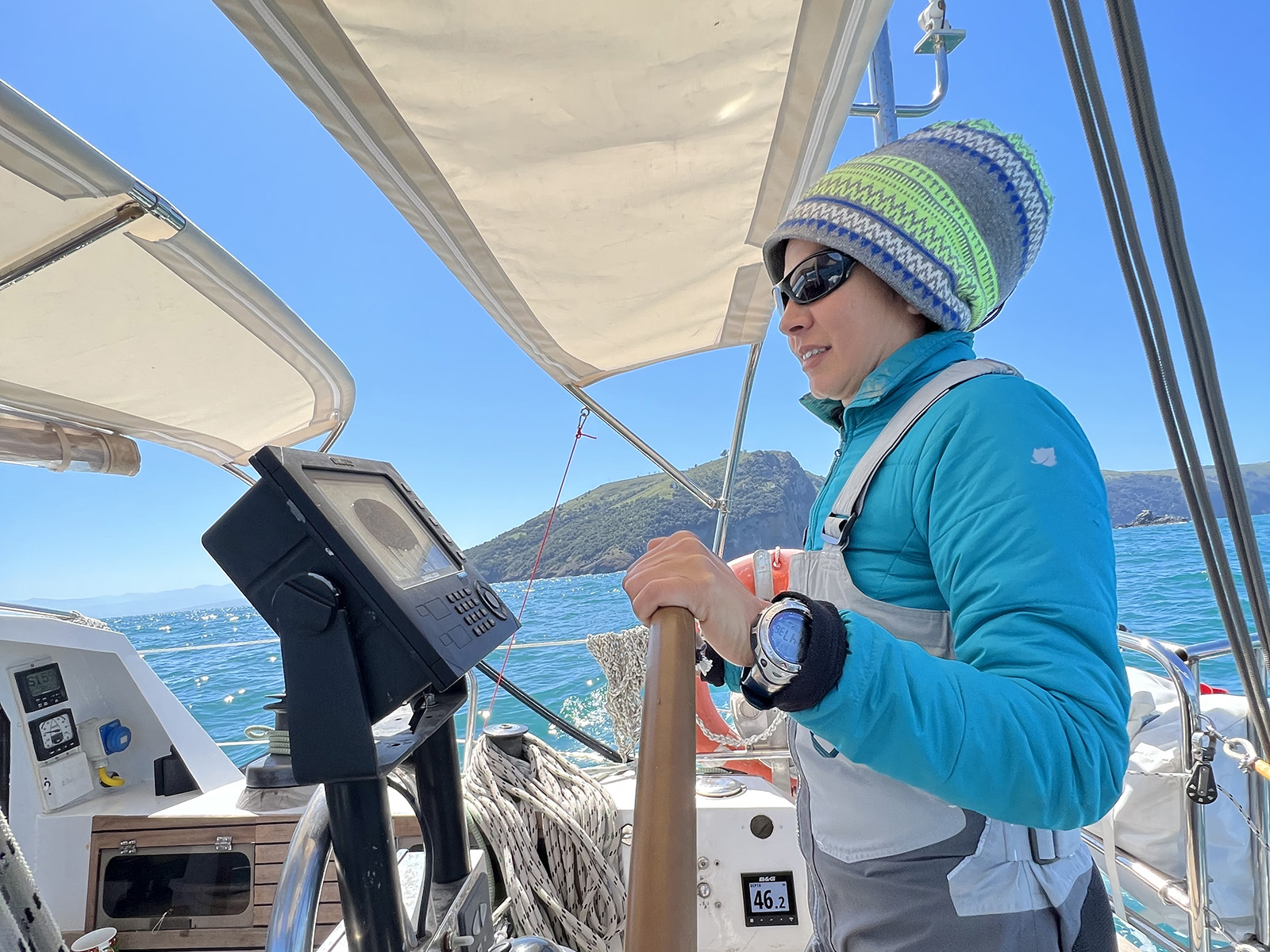Başak Mireli: Being Alone at Sea is a Great Self-Discovery
Sailors chase after the wind, but also trail everyone after it. One of the occupations of those left on land is to think about and wonder about them. Where is he/she now? Is everything ok? Who knows what he/she saw today, what beauty he/she encountered? Oh, if only he/she returns and we could talk about everything. This is so because they go ahead of us. They run when we think, they do when we hesitate. They are not so different from the sailors who discovered the continents in ancient times. They are the pioneers of our dreams. Başak Mireli is one of those people. She is a solo sailor who has spent her life at sea, keeping her horizons wide open on every subject, breaking the rules and being an inspiration to many people. Of course, we did just like everyone else. While she was chasing after new places, we chased after her.
Kayhan Yavuz: I think, the first question to ask a sailor is: Where are you now?
Başak Mireli: We are in Malta.
KY: Why are you there?
BM: It was on our way! Together with my husband Ömer Öcel, we have been on a world tour for about a month. We set sail from Gökova, after a few Greek islands, the Greek mainland, we threw ourselves into Malta.

KY: Which in order Turk are you on a world tour?
BM: I don't know the number exactly, but it must be something between 20 and 25. For example, there are currently five more Turkish boats on a world tour. The boat business has become partly easier, of course, thanks to technology. Compared to the times when Sadun Boro did this job, it's become easier.
KY: How long will your world tour take?
BM: I don't know, we'll see. I mean, time will tell. The important thing is not to reach a place all the time, but to enjoy the place where you go. We were always rushing before, here we have a much quieter life. This is something to get used to.
KY: Why so?
BM: Because we are city dwellers. We are constantly obliged to "perform". However, because we are used to feeling valuable "when we do something", standing for hours without doing anything, just reading a book can cause the feeling of "I wonder if I am doing something wrong". You have to deal with this feeling. But on the other hand, there is a unique sense of freedom in the sea that you cannot find in a city. This is your biggest help.
KY: So what's the schedule?
BM: Of course, first of all, there is an obligation to comply with the seasonal cycles. It is necessary to cross the Mediterranean before the weather gets tough. When you leave Gibraltar you go down to Cape Verde, this is the route everyone follows. Because you are setting sight on the trade winds. In other words, you follow the routes that you will not tire yourself and the boat too much. This has probably been the case since Christopher Columbus. But on the other hand, you decide some things en route. So we don't know how long it will take.
KY: "Not knowing" is one of the joys of sailing, isn't it?
BM: Sure. This ease is nice. We can stay here or keep going if we wish. Having such freedom is a great luxury in the modern world.

KY: So how do you handle the economy of this? You are always spending money, after all. Do you eat fish at all times?
BM: We are not a successful couple in this regard. Because we like to eat and drink. That's why we're always down. Of course, we are still in the Mediterranean Sea. All the best is here. We won't be able to find them when we get to the Pacific. If we can't find them, then we won't eat then, it's not that important. We're pretty unlucky with fish. We've done something like 10 thousand miles in the last 5 years. We've never caught any fish.
KY: Everyone would be wondering. Most people must be guessing wrong too. How much does this cost?
BM: Since 2018, we do not have a house, we've been living on a boat. We don't need a house. So first off, we live in a minimalist way. Such is life on the boat. It's based on savings because it's also an ethical issue. For instance, in the last month, we've not spend any money on the boat, we've not bought any water, and we've never entered into any marina. We produce our water by purification. You pay a fee for entry and exit transactions to the ports. Half tank of diesel, 150 liters. It's 200 Euro. You can do it for 1,000 to 1,500 Euro per month. I think it will definitely not exceed €1,500, and you can reduce down it to €500 Euro if you want.
KY: What equipment does the boat have?
BM: Ours is a Dutch designed 12 meter, 40 feet long-haul boat. It was made in Australia in 1997. Since it is metal, it is a heavy boat. Its dead weight is 16 tons. But it has a very wide sail, so we can still sail at 6-7 knots. I mean, ours is not a dull boat.
KY: Sailing is a very physical thing. It is a sport that is too serious for outsiders to recognize.
BM: Sure, sailing for three, four days is a serious effort. You get tired! We lose weight every day we spend at sea. For example, you do not sleep very well. You think you are sleeping, but you feel even the slightest movement of the boat. When you do this constantly, the body and the brain can no longer perform the same, it becomes necessary to rest.
KY: However, you don't give up!
BM: Sailing, being close to the sea, trying to be at peace with nature, being able to use the wind correctly and moving the boat, being able to do all of these in all weather conditions is something that keeps this person fit all the time. This is great excitement. Constant adrenaline. You are making a stuggle. You are trying to achieve something, to attain a goal. If you have the right personality, sailing is a great hobby. For example, I get asked a lot: "Aren't you afraid at all?". I'm afraid, of course, just like everyone else. But I love it too!
KY: After all, you are actually a racer. You have recently attempted to break in a record in Turkey Tour.
BM: Yes, unfortunately, I had to quit due to an electrical fault. From one point of view, the Turkey Tour is actually more difficult than the Atlantic crossing. You don't do that much maneuvering in the Atlantic. On the Turkey Tour, you have to deal with very different seas and constantly changing weather. There is also a serious maritime traffic.
KY: How did you feel when you quitted the tour?
BM: I got mad! I was angry at me, Ömer and everyone. This anger lasted too long. You feel a sense of failure. You know, you have to think about and get over it. I'm still thinking of it. It is necessary to cope with this feeling and to be open to continuous learning.
KY: Will you try again?
(OUR INTERVIEW IS INTERRUPTED HERE DUE TO THE CONNECTION PROBLEM. AFTER A COUPLE OF HOURS WE ARE SUCCESSFUL TO ESTABLISH THE CONNECTION AGAIN.)
KY: Hi. I lastly asked, "Will you try again?".
BM: Absolutely! As soon as the world tour is over, I will take my breath away in Hopa and finish what I started. Racing is part of the job, but there's also being alone on the high seas. My goal is to be the first Turkish female sailor to cross the Atlantic. You know, men do this, but no woman has stood out yet. After all, those who say "Bravo!" when men do it, they are like "Why bother?" when I say let me do.
KY: In fact, this is a sport that does not discriminate between men and women. It seems categorically egalitarian. Where do you experience discrimination the most?
BM: First of all, we have to accept that women are exposed to discrimination in all areas of life. For example, the news about male athletes is much more than the news about female athletes. Patriarchy is very common. It is very common to perceive women as a threat. There's also uppityness. For example, when I mean the Turkey record, the thing that is said to me the most is "You just finish it!"
KY: Have you ever said "Damn it!"?
BM: I've never said. My patience level is very high!
KY: Well, let's talk about the environment. You have been at sea for years. You are probably one of the best observers. How do you see the circumstance of the seas and the environment? For example, how has it changed in the recent 20 years?
BM: The world is getting polluted very quickly. The Aegean Sea, for example, leads the world in terms of pollution.
This has long passed the level to be struggled alone. Maybe we do a lot as individuals. That is to say, we do not use wet wipes, for example. We are against single-use disposable plastics and stuff like that. Well, I've visited schools for many years, made presentations to children and to raise their awareness. But the issue goes beyond individuals. Serious regulations and sanctions are needed. We are mistaken assuming that everything was created for us. However, we need to understand that the world does not belong only to us.
KY: So this is also a cultural issue. I think that upbringing matters. Growing up knowing, learning and loving the sea would probably make a lot of difference.
BM: We are not a sufficiently seafaring society. I see it here. There are people traveling in boats that are so small and primitive! We enter a cove and discuss for minutes where to anchor. Then a boat comes in and maneuvers three tacks within that cove. Those people also know how to protect the sea. As for us, we are a country surrounded by the seas, but unfortunately we are not seafarers. Even less, we haven't been able to reconcile even with our women going swimming. Maybe we don't want our people to thrive. Because the sea is civilization!
KY: Your trip is long, and let's not keep you busy any longer. Let's ask about your future plans and leave you alone with the sea.
BM: Firstly, I'll be crossing the Atlantic this December. Ömer will get off the boat in Cape Verde. I'll just go ahead and make the crossing. We have always talked about the women's issue, but Ömer's support is so valuable to me. There are not many such people in Turkey!
KY: What about when the world tour is over?
BM: After the world tour is over, I will go to Hopa. There is also a record to be broken there: Turkey Tour record. An unfinished business haunts my dreams. Another project that haunts my dreams is about children. I studied psychology. I want to open a special sailing rehabilitation center for disadvantageous children. The more children we introduce the sea, the better. Maybe then we can change life.
You can follow Başak Mireli on...
Interview: Kayhan Yavuz, Setur Marinas Highlights Editor


